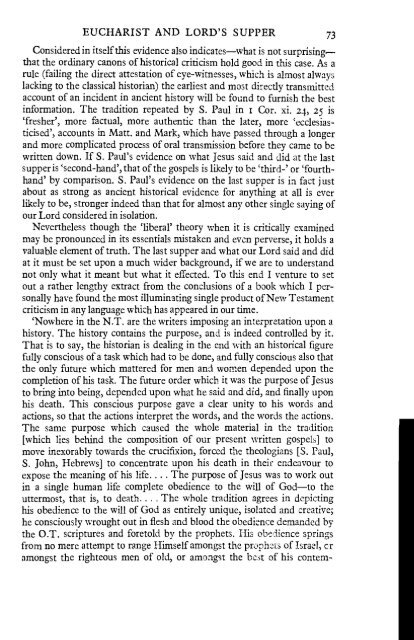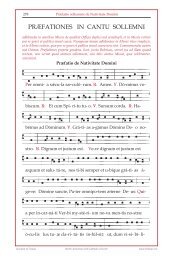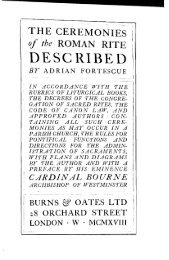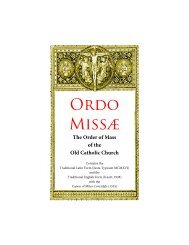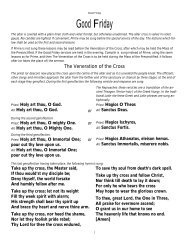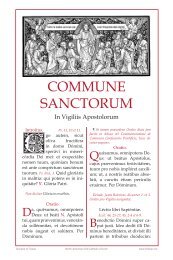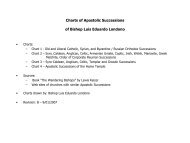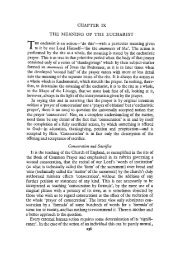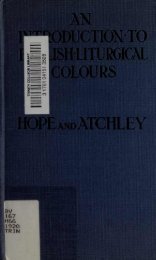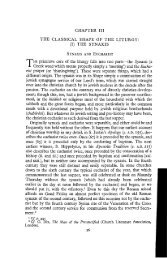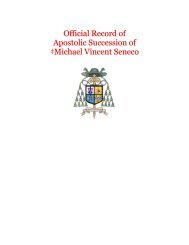Eucharist and Lord's Supper
Eucharist and Lord's Supper
Eucharist and Lord's Supper
You also want an ePaper? Increase the reach of your titles
YUMPU automatically turns print PDFs into web optimized ePapers that Google loves.
EUCHARIST AND LORD'S SUPPER 73<br />
Considered in itself this evidence also indicates-what is not surprisingthat<br />
the ordinary canons ofhistorical criticism hold good in this case. As a<br />
rule (failing the direct attestation of eye-witnesses, which is almost always<br />
lacking to the classicalhistorian) the earliest <strong>and</strong> most directly transmitted<br />
account of an incident in ancient history will be found to furnish the best<br />
information. The tradition repeated by S. Paul in I Cor. xi. 24, 25 is<br />
'fresher', more factual, more authentic than the later, more 'ecc1esiasticised',<br />
accounts in Matt. <strong>and</strong> Mark, which have passed through a longer<br />
<strong>and</strong> more complicated process of oral transmission before they came to be<br />
written down. If S. Paul's evidence on what Jesus said <strong>and</strong> did at the last<br />
supper is 'second-h<strong>and</strong>', that of the gospels is likely to be 'third-' or 'fourthh<strong>and</strong>'<br />
by comparison. S. Paul's evidence on the last supper is in fact just<br />
about as strong as ancient historical evidence for anything at all is ever<br />
likely to be, stronger indeed than that for almost any other single saying of<br />
our Lord considered in isolation.<br />
Nevertheless though the 'liberal' theory when it is critically examined<br />
may be pronounced in its essentials mistaken <strong>and</strong> even perverse, it holds a<br />
valuable element of truth. The last supper <strong>and</strong> what our Lord said <strong>and</strong> did<br />
at it must be set upon a much wider background, if we are to underst<strong>and</strong><br />
not only what it meant but what it effected. To tlus end I venture to set<br />
out a rather lengthy extract from the conclusions of a book which I personally<br />
have found the most illuminating single product of New Testament<br />
criticism in any language which has appeared in our time.<br />
'Nowhere in the N.T. are the writers imposing an interpretation upon a<br />
history. The history contains the purpose, <strong>and</strong> is indeed controlled by it.<br />
That is to say, the historian is dealing in the end with an historical figure<br />
fully conscious of a task which had to be done, <strong>and</strong> fully conscious also that<br />
the only future which mattered for men <strong>and</strong> women depended upon the<br />
completion of his task. The future order which it was the purpose of Jesus<br />
to bring into being, depended upon what he said <strong>and</strong> did, <strong>and</strong> finally upon<br />
his death. This conscious purpose gave a clear unity to his words <strong>and</strong><br />
actions, so that the actions interpret the words, <strong>and</strong> the words the actions.<br />
The same purpose which caused the whole material in the tradition<br />
[which lies behind the composition of our present written gospels] to<br />
move inexorably towards the crucifixion, forced the theologians [So Paul,<br />
S. John, Hebrews] to concentrate upon his death in their endeavour to<br />
expose the meaning of his life.... The purpose of Jesus was to work out<br />
in a single human life complete obedience to the will of God-to the<br />
uttermost, that is, to death.... The whole tradition agrees in depicting<br />
his obedience to the will of God as entirely unique, isolated <strong>and</strong> creative;<br />
he consciously wrought out in flesh <strong>and</strong> blood the obedience dem<strong>and</strong>ed by<br />
the O.T. scriptures <strong>and</strong> foretold by the prophets. His obedience springs<br />
from no mere attempt to range Himself amongst the propheLs of Israel, cr<br />
amongst the righteous men of old, or amongst the best of his contem-


